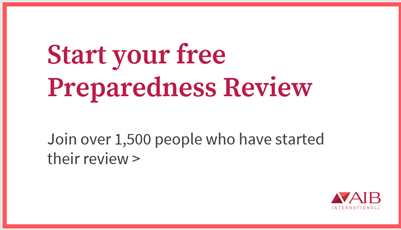13 Pitfalls of Pandemic Preparedness Even Top Companies Make And How You Can Fix Them
Earlier this week, AIB International’s Judi Lazaro offered a webinar on the “13 Pitfalls of Pandemic Preparedness Even Top Companies Make And How You Can Fix Them”. You’ll be surprised at what even the best food and beverage companies are missing from their pandemic preparedness plans. We were.
In our reviews, we found that 75 percent of companies missed critical requirements in their plans. In fact, 75 percent also missed health crisis mitigation and management requirements.
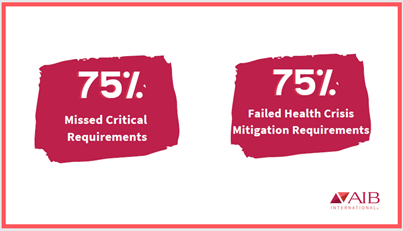
For some, these misses broke their supply chain. For others, lack of planning and preparation left their operations and employees vulnerable to the impacts of the pandemic.
Watch the Webinar Save the slides for reference
We've compiled these 13 pitfalls so you can avoid making these same mistakes and keep your operations resilient in future crises.
1. Not Having a Plan that Covers a Pandemic Crisis Scenario
You likely have a crisis plan that prepares you for a food safety recall or natural disaster, but does it define your response to a pandemic? And who owns/manages that plan?
We found that many companies had their plans fragmented. Some parts were with their environmental health and safety group, some was at corporate. In a pandemic, it’s crucial that your pandemic preparedness plan is easy to find and in one place.
2. Not Holding Crisis Management Team Meetings
During the pandemic, meeting with your team is critical so you can assess whether your plan is working properly. Communication is key for a crisis management plan to work!
3. Not Putting PPE or Chemicals Through Your Supplier Approval Process
Just like everything else you purchase for your operation, your PPE and chemical suppliers should be vetted and approved.
During the initial wave of COVID-19, there was an unprecedented shortage of PPE and chemicals, and many companies didn’t think to follow their supplier approval process for these items.
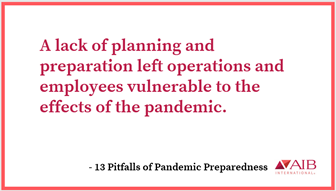
4. Not Ensuring Effective COVID-19 Chemicals
This was another issue we saw from the rush on PPE and chemicals. Many companies didn’t double check that the chemicals they bought actually worked for coronavirus.
The chemicals you’re using should be labeled as effective for the destruction of COVID-19. If not, you may not be cleaning what you intend to and undermining employee confidence.
5. Not Planning for Shutdowns
Make sure you have a contingency plan for shutdown. Whether due to positive employee tests or a government mandate, a shutdown could happen to you, and you need to be prepared.
If you have to shut down due to a COVID-19 emergency, here’s a list of things you should consider.
6. No Consideration for Expiration of Ingredients
Even though your production schedule may have changed, you must continue rotating your stock of ingredients, controlling perishable materials and those that are insect susceptible.
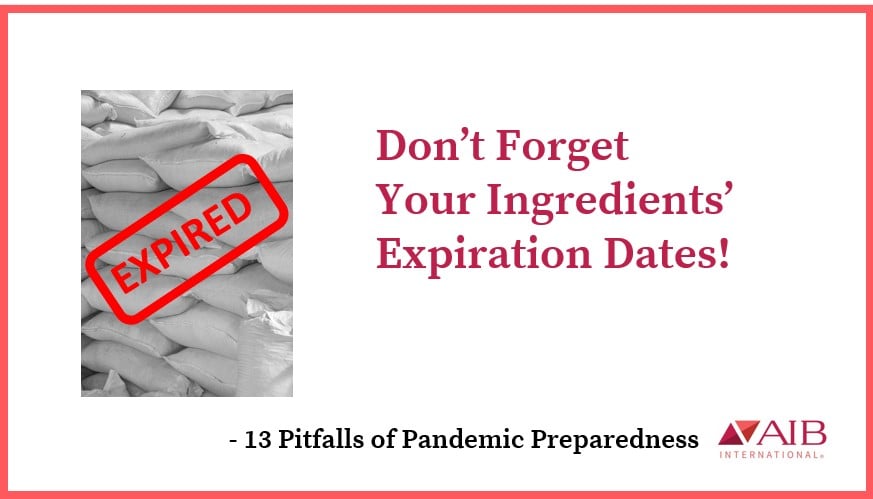
7. No Plans for How to Inspect and Clean the Lines for Start-up
If you've experienced a long-term shutdown, preparation for start-up is key and different from an “after weekend” shutdown.
Here are some things to consider if you need to start up your facility after a shutdown due to a COVID-19 incident. See the other recommendations for shutting down or ramping up here.
- Food Safety Essentials
Prevention requires effective social distancing. How do you control people flow, minimizing cross infection? Production shifts planning, breaktime planning, man-materials flow mapping and waste flow mapping. Can you use different colored uniforms/bump caps to identify different shifts and visitors? Our training can provide your team the expertise necessary to continue producing safe, high-quality food. - Ingredients Supply Review
What you have done well in your own facility is one part of the supply chain. This situation calls for an active communication with your suppliers, requiring a confirmation of their food safety and GMP programs. - Food Labeling Review
Be highly sensitive to ingredient changes. Mixing room operators can be the first line of defense to identify ingredient changes, identifying ingredients that have gone bad because of logistics delays, or because the ingredient storage conditions have changed. In case an ingredient needs to be changed because of any reason, product label review is critical. - PPE and Isolation Practices
Does your team have the right gear to not only maintain food safety, but also personnel/worker safety?
8. Discarding Used PPE in Regular Trash Containers
Treat used PPE as if it is contaminated. This may mean dedicating a trashcan to PPE and training on its use. You should also have a protocol on disposing the PPE waste.
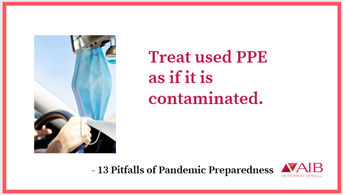
9. Reusable Masks Taken Home
Maintain control of masks and other protective garments by providing them to your employees and not allowing them to be taken home.
10. Donning and Doffing Procedures Not Defined
Make sure there is a procedure in place for where and how PPE is put on and taken off.
The CDC has a great video showing how to don and doff PPE.
Basics Prerequisites Many Are Still Missing
This section includes elements that should be in your prerequisite review. We even found many companies struggling with these basics of any food safety plan. While new aspects of pandemic planning like PPE are important, don’t forget about also enforcing these basics.
11. Not Training Site Employees on Changes Implemented to the Food Defense Plan in Response to COVID-19
Given the changes you’re making to your protocols, your food defense program may have been updated. Review your food defense program with your food defense team and make sure your site employees know what these changes are.
12. Not Assessing Risk During the Receiving Process
Consider exposure to your drivers, handling paperwork, pallet jacks, even bathroom breaks for visitors. Do you have procedures in place and communicated for each?
13. Gaps in Managing the IPM Program
We know of some companies that told their pest management partners to stay off-site. That’s not best practice if they want to control pests in their facility.
Not only will having Pandemic Prepared Certification successfully prepare your operation for the future, the Certification will instill customer and employee confidence in your operation and demonstrate your commitment to safety. To begin, download our Free Preparedness Review, which introduces you to the five critical components on pandemic preparedness.
Contact us at ppc@aibinternational.com if you have questions or need additional information.
Judi Lazaro
 Judi Lazaro is the Senior Category Director for Food Safety at AIB International, where she works with leading food and beverage companies to maintain the highest food safety and integrity standards though consulting, inspection and training. Judi is passionate about sharing her over 30 years of food safety and quality experience with associations, governments and universities around the world. Judi is a in-demand expert on pandemic preparedness, FSMA, Integrated Pest Management and brand protection.
Judi Lazaro is the Senior Category Director for Food Safety at AIB International, where she works with leading food and beverage companies to maintain the highest food safety and integrity standards though consulting, inspection and training. Judi is passionate about sharing her over 30 years of food safety and quality experience with associations, governments and universities around the world. Judi is a in-demand expert on pandemic preparedness, FSMA, Integrated Pest Management and brand protection.
Pingback from aibinternational.com
Food First Blog | 75% of Businesses Miss These COVID-19 Mitigatiohttps://www.aibinternational.com/en/Food-First-Blog/PostId/1380/75-of-businesses-miss-these-covid-19-mitigation-measures

